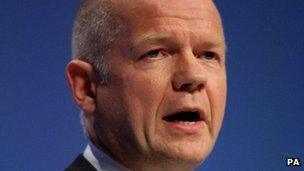William Hague: Two-state Mid-East peace chance slipping away
- Published

William Hague described the situation in the Middle East as "very urgent"
UK Foreign Secretary William Hague has warned that the chance of a two-state solution in the Middle East peace process is "slipping away".
He said he would tell the US government that the issue should be the "highest priority" for foreign policy when he visits Washington next week.
Mr Hague is due to hold talks with Senator John Kerry, who is expected to become the next US Secretary of State.
His comments follow increased Israeli settlement activity in the West Bank.
This has occurred since the United Nations voted last year in favour of Palestinian statehood.
Israel's prime minister Benjamin Netanyahu has said no Jewish settlements in the West Bank will be removed during his next term in office if he wins elections on Tuesday.
About 500,000 Jews live in more than 100 settlements built in the West Bank and East Jerusalem since Israel occupied the area in 1967. The international community considers the settlements illegal, though Israel disputes this.
'Disastrous'
Answering questions in the House of Commons, Mr Hague said the prospect of a two-state solution to problems in the Middle East was "not yet at an end", although the situation was "very urgent".
He added: "The clock is ticking, with potentially disastrous consequences for the peace process."
He said he would be telling the new Obama Administration that "this should be the highest priority for US foreign policy, even given all the other threats we face".
The situation required the United States to take the lead because of its unique ability to influence the Israelis, Mr Hague argued.
He said: "If we don't make progress in the coming year, people will be increasingly convinced that a two-state solution is impossible."
On 29 November last year, the United Nations General Assembly voted to upgrade the status of the Palestinians to that of a "non-member observer state".
This followed a failed bid to join the international body as a full member state in 2011 because of a lack of support in the UN Security Council.
- Published18 January 2013
- Published20 December 2012